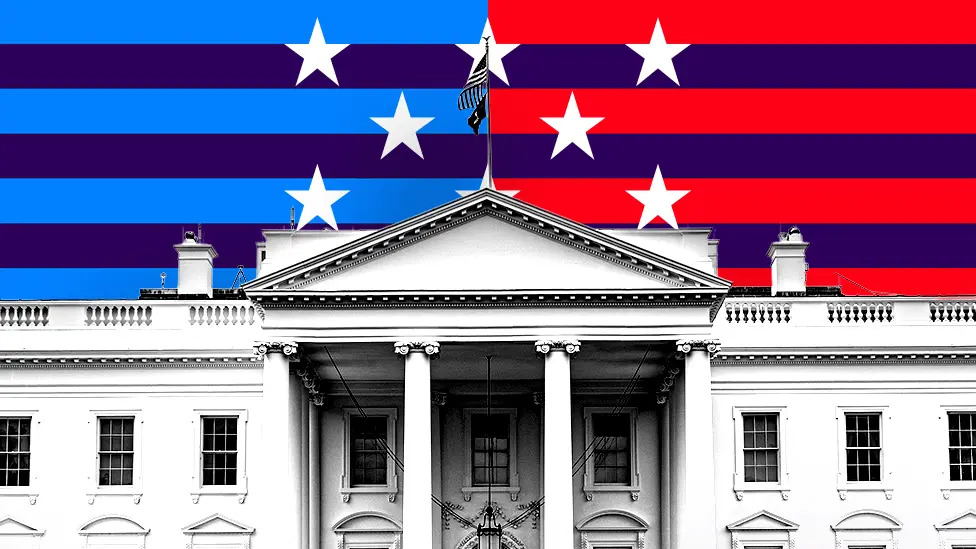- 📈 CTV and Retail Media Growth: The election outcome could impact the growth of Connected TV (CTV) and retail media, two fast-growing channels in digital advertising, with different effects under Trump or Harris administrations.
- 🏷️ Inflationary Pressures: A Trump win may result in inflationary pressures due to proposed tariffs, potentially increasing retail media value but also creating barriers for new advertisers.
- 🔍 Privacy Legislation: A Harris administration might lead to increased privacy regulation impacting CTV, possibly benefiting established platforms like Amazon and Roku.
- ⚖️ Regulatory Shifts: The tech regulation landscape, including potential actions against Google and content moderation policies, hinges significantly on the election winner.
- 💻 Content Moderation: Under Trump, social media may see relaxed content policies affecting brand safety, while Harris could enforce stricter guidelines.
- 📺 Traditional Media Dynamics: The election could either boost traditional media engagement, as experienced during Trump’s previous term, or lead to a steady news cycle with Harris.
- 🚫 TikTok Uncertainty: The future of TikTok in the US remains uncertain,with potential policy shifts depending on the administration.
In the midst of any US presidential election, businesses and marketers alike brace for the ripple effects that the winning administration’s policies may have on the industry. The 2024 election is no exception, with significant implications expected for the arena of digital advertising. From Connected TV (CTV) and retail media growth to regulatory shifts and privacy legislation, the evolving political landscape promises to reshape digital advertising’s future.
The Influence on CTV and Retail Media
Connected TV (CTV) and retail media have emerged as two of the fastest-growing channels in digital advertising, drawing considerable interest and investment. However, the election outcome could play a critical role in affecting their trajectories.
CTV Dynamics
A potential Kamala Harris administration might usher in a wave of progressive privacy legislation, potentially imposing stricter regulations on CTV. This shift might align CTV with the privacy scrutiny that other sectors have faced, such as the disruption caused by the phasing out of third-party cookies. Despite this, the sustained momentum behind digital streaming suggests that CTV ad spending will remain buoyant.
CTV Implications:
- Pro-Regulation Scenario: Enhanced privacy regulations may favor established “walled gardens,” like Amazon and Roku, providing them with a competitive edge.
- Business Strategy Tip: Marketers should consider investments in these platforms, potentially diversifying their ad spend across other privacy-compliant platforms.
Retail Media’s Resilience
In contrast, should Donald Trump secure the presidency, inflationary pressures from proposed tariffs could elevate the value of retail media, pushing it as a high return-on-ad-spend channel. However, these inflationary tendencies might also deter new advertisers due to increased entry barriers.
Retail Media Implications:
- High-Inflation Environment: Existing players might benefit, but new entrants could face challenges optimizing campaigns amidst tightening budgets.
- Strategic Insight: Businesses must hone their strategies, focusing on optimizing high-ROAS channels and preparing for fluctuating costs.
Regulatory Shifts & Privacy Concerns
The regulatory landscape, especially concerning tech giants and privacy issues, remains a pivotal area influenced by election results.
Potential Tech Regulation Changes
A Harris-led administration could amass support for breaking up dominant players like Google, potentially intensifying competition within the ad tech space. Conversely, Trump might lean towards a business-friendly approach, though his campaign has targeted specific companies like Google in the past.
Key Considerations:
- Harris Strategy: Brands should prepare for possible disruptions in Google’s ecosystem, strategizing around competition and compliance.
- Trump Strategy: Companies might find new opportunities with relaxed content moderation policies, though brand safety concerns may arise.
Content Moderation & Brand Safety
Social platforms could undergo substantial policy changes, contingent on the administration in power. Trump may favor fewer content restrictions, potentially affecting brand safety, while Harris might introduce stricter guidelines under content regulations.
Affiliated Risks:
- Branded Content: With varying content policies, advertisers must assess the safety and appropriateness of platforms, possibly revisiting their advertising strategies.
- Proactive Measures: Reassess partnerships and align with platforms that uphold robust content moderation aligning with brand values.
Traditional Media and TikTok’s Future
Traditional media companies might capitalize on shifting political narratives, with a potential “Trump bump” mirroring spikes in viewership seen during his first term. On the other hand, a Harris presidency may cultivate a steadier flow of news cycles with sporadic legislative peaks.
Traditional Media Dynamics:
- Trump’s Influence: Increased viewers could buoy media houses, offering a transitional cushion towards digital adoption.
- Harris-Steady Cycle: A less volatile media environment fosters stability, though companies should prepare for episodes of intense legislative coverage.
TikTok’s Uncertain Terrain
The fate of TikTok is emblematic of broader technological and geopolitical frictions, possibly diverging based on the election outcome. Trump’s previous stance shifted from advocating a ban to a more protective approach, influenced by stakeholder interests. Meanwhile, Harris advocates caution due to national security concerns.
TikTok Strategy:
- Adaptive Marketing: Consider the platform’s future viability and adjust marketing strategies to align with potential regulatory developments.
Conclusion: Navigating the Future of Digital Advertising
As we await the unfolding outcome of the US presidential election, businesses must remain agile and informed. Understanding the intersections between political decisions and digital advertising highlights the importance of strategic foresight, allowing companies to stay ahead of impending shifts.







